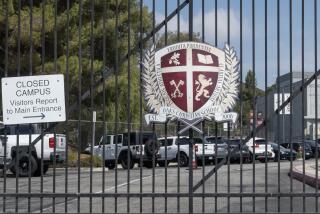Readers React: College microaggression: Stop telling black students to ‘move on’
- Share via
To the editor: Jonathan Zimmerman’s Op-Ed article reflects a very serious lack of understanding of the damage done by racial discrimination. (“Take a cue from Ralph Ellison: Don’t demean minority students by overprotecting them,” Op-Ed, Nov. 20)
I doubt that Ralph Ellison would agree with Zimmerman’s conclusion that the verbal assaults experienced by African Americans today are only a “distraction.” Ellison’s seminal novel, “Invisible Man,” reflects a black man’s efforts to find his place in society while being treated as nonexistent or invisible.
The verbal assaults tossed at will by some whites today are simply their way of enforcing segregation, a means of stating, “You are not as good as I am.” When that is encountered over and over again, it has a very serious effect on one’s psychic well-being.
As society becomes more integrated and African Americans are seen in more and more facets of society, too many whites view verbal assaults as one of the few remaining ways they can preserve their sense of superiority. They are afraid to state openly that African Americans are not worthy of being treated like everyone else, so they engage in veiled attacks.
That is quite different from what Ellison experienced or wrote about.
Philip Johnson, Rancho Palos Verdes
..
To the editor: The very term “microaggression” is a tortured semantic construct reducing real societal problems of race and wealth inequality to micro absurdity while creating macro problems on our college campuses.
When a probably overtired, well-intentioned Claremont McKenna College dean’s career is put on the chopping block for making a poor word choice in responding to a student email, we tuition-paying parents must question the wisdom of overpaid college presidents. Acceding to student complaints of microaggression has a chilling effect on casual social discourse.
Why stop and strike up a conversation with a student who may interpret a poor word choice or clueless remark as a harmful assault? Safer just to keep quiet and walk on by.
Sharon Rosen Leib, Solana Beach
..
To the editor: I’m sure Zimmerman feels he’s on solid ground using a quote by the black author Ellison to promote his theory that we as black people need to get over these everyday slights that our white brethren continue to heap on us.
However, there is another quote — from the sharecropper and civil rights activist Fannie Lou Hamer — that comes to mind: “I’m sick and tired of being sick and tired.”
I am sick and tired of your Halloween costumes depicting us as gang members and servants, your monuments to racism at Stone Mountain in Georgia, your Confederate flags and your Op-Ed pieces calling for us to get over it.
It seems like anything less that being shot down by the police, passed over for a promotion or given a higher interest rate is not worthy of a reaction.
Hey, I’m now on my way to a “cracker party,” where we are all dressing up like the humorless white people at work who can’t dance and only wear pastels. I’m going as Pam and my partner is going as Bob. Isn’t that funny?
Gail Christian, Palm Springs
..
To the editor: Microaggressions are insensitive words spoken face to face. But none of the examples cited by Zimmerman are microaggressions.
Instead, he cites mesoaggressions — impersonally issued emails by academics in authority who clearly do not understand how their words will be perceived, failing to interact on a personal level where they could learn interculturally from their students.
Michael Haas, Los Angeles
Follow the Opinion section on Twitter @latimesopinion and Facebook
More to Read
A cure for the common opinion
Get thought-provoking perspectives with our weekly newsletter.
You may occasionally receive promotional content from the Los Angeles Times.









